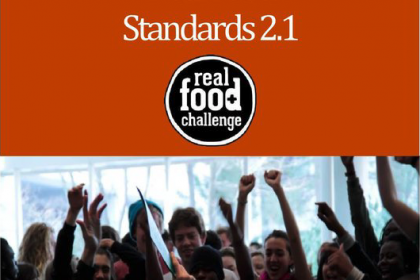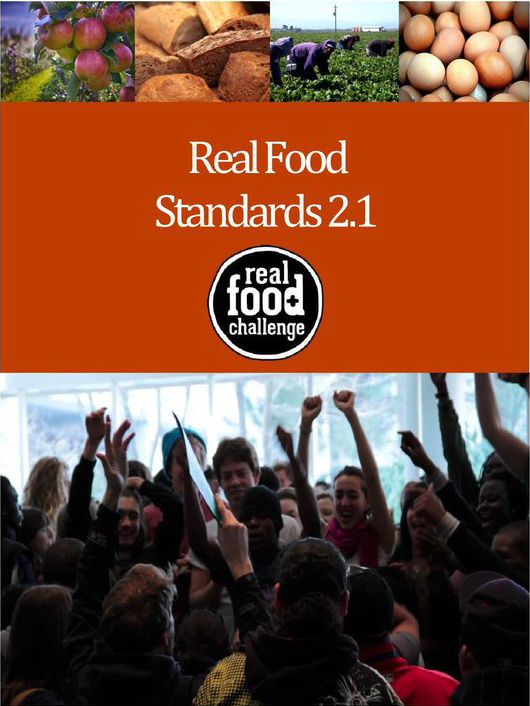
This week’s lead blog post comes from our colleagues at Real Food Challenge, active members of the Food Solutions New England regional network.
 Real Food Challenge is excited to announce a technical update to our Real Food Standards! In an effort to keep our Standards aligned with changes in the food industry, Real Food Challenge students and alumni leaders have conducted research in consultation with industry experts, partners, and key stakeholders. Below is the rationale for a Standards update and discussion of some key decisions. You can find the exact updates in the Real Food Guide 2.1 and more specific explanations of the updates in the Real Food Standards package.
Real Food Challenge is excited to announce a technical update to our Real Food Standards! In an effort to keep our Standards aligned with changes in the food industry, Real Food Challenge students and alumni leaders have conducted research in consultation with industry experts, partners, and key stakeholders. Below is the rationale for a Standards update and discussion of some key decisions. You can find the exact updates in the Real Food Guide 2.1 and more specific explanations of the updates in the Real Food Standards package.
Our food system is constantly shifting and changing, and we’re responding
In response to changes in certifications and in food policy, the Real Food Standards Council reviewed the criteria and certifications from the Real Food Guide 2.0 to ensure their continued alignment with our vision for the food system. The Council conducted deeper research into the questions students and dining staff have surfaced since the 2016 launch of the Real Food Standards 2.0. In some cases, this resulted in updates to the Guide. In other cases, pre-existing food policies and industry regulation were insufficient to address the issue – a reminder of the food system’s continued failure to serve producers, consumers, workers, and communities. This technical update also captures deeper understandings of the food system to reflect emerging consensus amongst food justice and food industry organizations.
We must continue to call out injustice
The Standards have been updated to include prison labor as part of the disqualification of forced labor. Prison labor operates in a setting where the worker is not free and is instead under the persistent threat of violence, surveillance, and control. Regardless of pay or working conditions, it is involuntary and fundamentally unjust (and still legal). The state and corporations are able to profit off of the labor of incarcerated people, which creates an incentive to increase rates of incarceration, separating families and devastating communities. This disproportionately affects Black people and other racialized people. For additional context on the decision to include a prison labor disqualification, please refer to the prison labor position paper in our Real Food Standards package.
And fight for a food system that truly nourishes us all
The Fair category has also been altered to include the Small Producers’ Symbol certification. The Small Producers’ Symbol (SPP) is an “alliance among organized small producers to build a local and global market”. The SPP leans on the knowledge and expertise of small producers from organizations that value democratic organization and respect for local cultures, local economies, and environmental and human health. During a time of industry consolidation and egregious human rights violations in our food system, the necessity of supporting certifications with values like SPP’s is clear. SPP and other certifications in the “green light” section of the Real Food Guide continue to represent the highest standard of Real Food.
With this update, the Real Food Standards continue to uphold a vision for a more just and sustainable food system for all. We continue to place producers lives’ and dignity at the forefront of our Real Food Standards and values, and we challenge the corporations that seek to overrun our communities and local economies.
We look forward to continuing to move towards a more just and sustainable food system with you!
Still have questions? Email us at calculator@realfoodchallenge.org.



